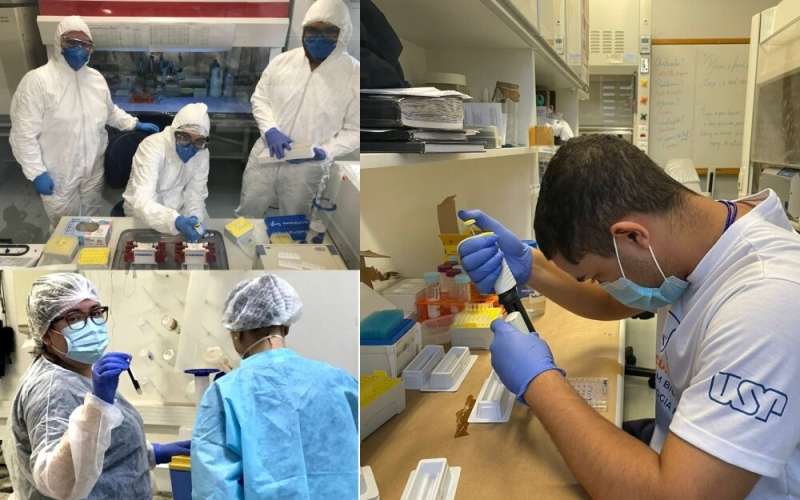
Since the start of the COVID-19 pandemic, a class of corticosteroids called glucocorticoids (GCs) has become established as one of the main treatment options, especially for severe cases, thanks to their anti-inflammatory and immunosuppressant action. Brazilian researchers recently discovered new ways in which these drugs influence the organism’s inflammatory response during an infection: They raise levels of endocannabinoids (eCBs), molecules produced by the organism itself and that bind to the same receptor as cannabidiol; and they lower blood levels of platelet-activating factor (PAF), a lipidic mediator of inflammation and clotting.
The results of the study are reported in an article published in the journal Viruses.
“Because endocannabinoids have neurological and anti-inflammatory functions, we set out to investigate whether patients with mild symptoms of COVID-19 were more protected thanks to natural production of these molecules and whether their levels were lower in severe cases, causing exacerbated inflammation and the need for intensive care,” said Carlos Arterio Sorgi, principal investigator for the study and last author of the article. Sorgi is a professor in the Department of Chemistry at the University of São Paulo’s Ribeirão Preto School of Philosophy, Sciences and Letters (FFCLRP-USP) in São Paulo state.
Another aim of the study was to find out whether levels of PAF were higher in severe COVID-19. If so, this could explain the excessive clotting and microthrombus formation seen in these patients. For this analysis, the group used the infrastructure available at the Center of Excellence in Lipid Quantification and Identification (CEQIL), attached to the Ribeirão Preto School of Pharmaceutical Sciences (FCFRP-USP).
Using high-resolution mass spectrometry, however, the researchers observed the opposite of what they expected: increased levels of endocannabinoids and reduced levels of PAF in severe patients.
To understand these results, they performed a detailed analysis of data from a large group of mild and severe patients treated at home or in hospital wards or intensive care units (ICUs), including clinical parameters and pharmaceutical management. They then submitted all the data to multivariate statistical tests.
“We concluded that the increase in endocannabinoids and decrease in PAF was not caused by the disease but by treatment with GCs [glucocorticoids],” Sorgi said. “The classical pharmacological mechanism of these drugs is well-known, but their effects on these biomolecules had never before been discussed in the literature.”
Analysis of the transcriptome (the sum total of all the messenger RNA molecules) in leukocytes from the patients treated with GCs also pointed to differential modulation of monoacylglycerol lipase and phospholipase A2 gene expression, showing that these drugs can alter the activity of enzymes involved in the metabolism of the lipidic mediators analyzed. Leukocytes are white blood cells and part of the immune system.
Novel treatments
The findings open up possibilities for future treatments with corticosteroids not only for COVID-19 but also for other severe inflammatory and neurological diseases. They also suggest that cannabinoids, natural or artificial, could be used for adjuvant therapy.
“Combining the effects of the two compounds would create the best scenario possible,” Sorgi said.
Next steps will include studies involving patients with other viral diseases, such as flu, to see if production of the lipidic biomolecules in question is also altered by the action of corticosteroids and if the organism maintains the same capacity to produce endocannabinoids after vaccination against COVID-19 and during convalescence from the disease.
“We’re also interested in partnering with groups who work with cannabidiol for animal trials, since we’re now in a different phase of COVID-19,” Sorgi said.
More information:
Jonatan C. S. de Carvalho et al, The Interplay among Glucocorticoid Therapy, Platelet-Activating Factor and Endocannabinoid Release Influences the Inflammatory Response to COVID-19, Viruses (2023). DOI: 10.3390/v15020573
Citation:
Study reveals novel action mechanism of corticosteroids in combating inflammation caused by COVID-19 (2023, May 18)
retrieved 18 May 2023
from https://medicalxpress.com/news/2023-05-reveals-action-mechanism-corticosteroids-combating.html
This document is subject to copyright. Apart from any fair dealing for the purpose of private study or research, no
part may be reproduced without the written permission. The content is provided for information purposes only.
Source link




